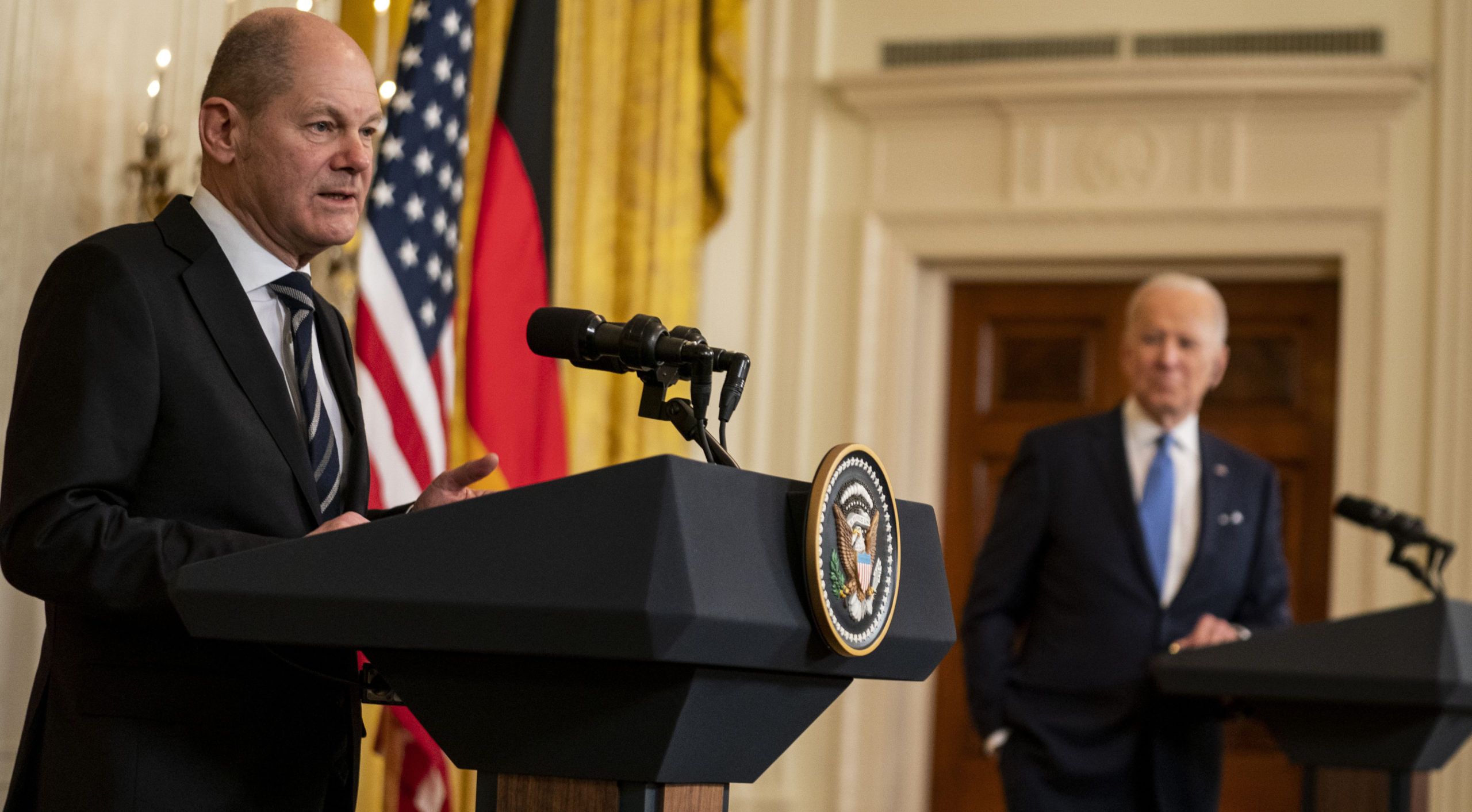‘If Russia invades…there will be no longer a Nord Stream 2,’ said US President Joe Biden in a press conference this week. Standing next to him, the German chancellor Olaf Scholz was visibly uncomfortable, determined not to say those words himself. Germany would not be dragged out onto the stage of world politics, not even when pushed by its most powerful friend and ally.
As was to be expected, Scholz’s first trip to Washington as German chancellor was dominated by the Ukraine crisis. Both sides were visibly keen to put on a show of unity, for the world and particularly for Moscow. But the deep economic rifts between their nations were laid bare. Though the leaders tried to avoid the topic, the contentious Nord Stream 2 gas pipeline was so obviously tiptoed around in the opening remarks that it fell to journalists to bring it up: “will you commit today to pull the plug?”
Scholz was visibly annoyed that he was asked the question repeatedly. When yet another journalist wanted to know if he didn’t think he could win back some trust from allies by naming Nord Stream 2 explicitly as a sanction, he rolled his eyes in exasperation and then looked pleadingly over to Biden who graciously answered on his behalf.
It is feasible that the two men agreed behind closed doors that it would fall to Biden to make the threat of Nord Stream 2 explicit while Scholz remains ‘strategically ambiguous’. But this is hardly going to convince anyone that Germany means business, least of all Vladimir Putin.
Domestic and diplomatic pressure has at last triggered the German chancellor into physical action. After months of inactivity, he has now seen the Presidents of the US, France and Poland, given two major TV interviews and scheduled a meeting with Putin . His foreign Minister Analena Baerbock has also gone back to Ukraine to tour the front lines and be photographed in protective gear, suggesting that the commitment and empathy that the Ukrainians have been demanding from Berlin had been there all along. However, CNN’s Jake Tapper has been told that President Zelensky refused to see her because of the ongoing refusal to name Nord Stream 2 as a sanction despite the sudden visibility of the chancellor.
In fact, Scholz was so keen to get his message across to the US and the world, that he even switched to English at one point during the press conference with Biden and for the interview he gave Tapper on CNN later. But the appearance was yet another display of ‘strategic ambiguity’ — the phrase ‘financial support’ just won’t translate into concrete action, regardless in what language or how often it is said.
Scholz’s first appearance in front of a world audience has made it clear that he does not envision Germany in a geopolitical leadership role. The fourth largest economy of the world is happy to remain a mere ‘strategic partner’, financially supporting decisions made elsewhere. While Scholz confirmed that Britain may use German airspace and that American troops are welcome on German soil, Berlin will not send weapons, allow its weapons to be sent by others or commit to severe economic sanctions against Russia.
Scholz is already coming under heavy fire at home. A new survey has shown that only one in five Germans think Scholz has been a good chancellor so far. By contrast half the population believed he would be when he took office in December. Only 8% believe that he shows strong leadership.
Since Scholz has taken office in December, his low profile and conflict-averse instincts have left Germany rudderless. The leadership change was a chance for the country to emerge from the sluggish indecision of the Merkel era. But as Germany blinked into the glare of a world full of conflict, it decided to put its head back in the sand.











Join the discussion
Join like minded readers that support our journalism by becoming a paid subscriber
To join the discussion in the comments, become a paid subscriber.
Join like minded readers that support our journalism, read unlimited articles and enjoy other subscriber-only benefits.
Subscribe